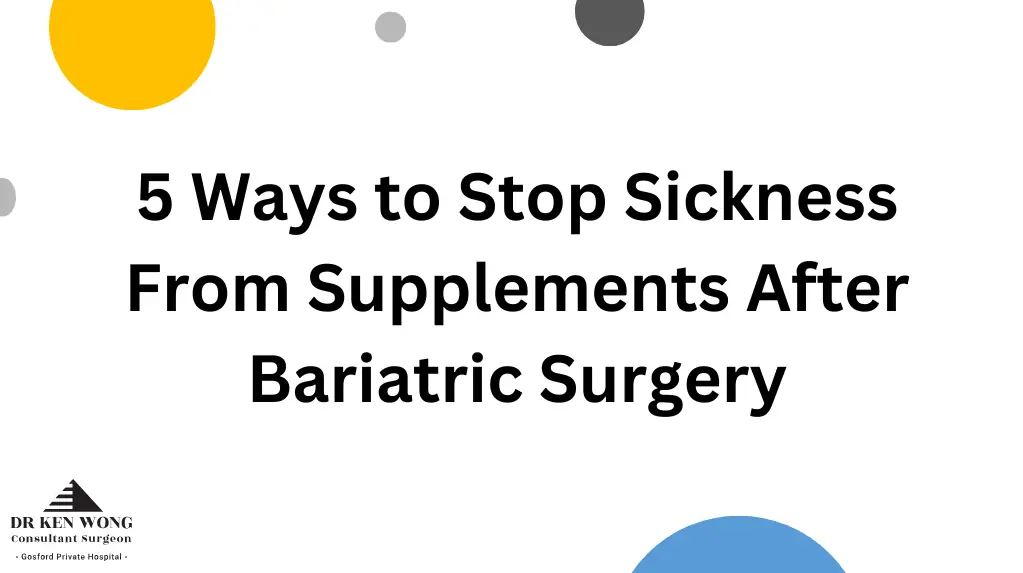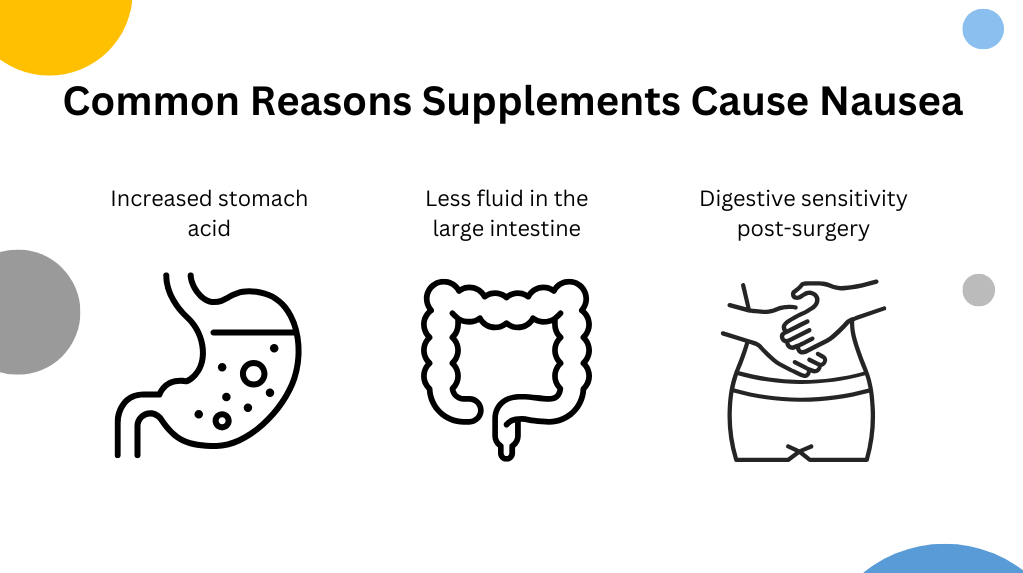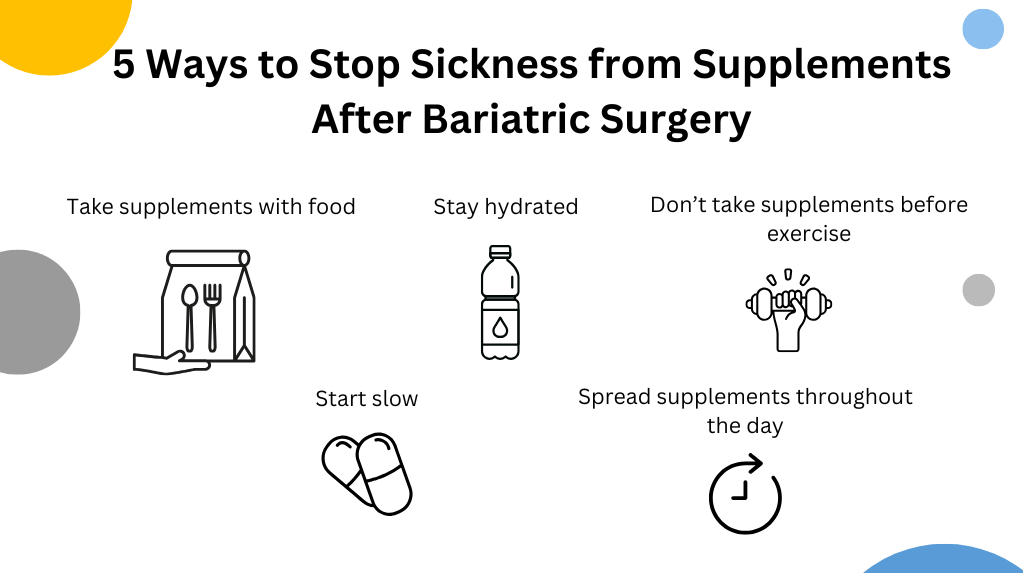
Supplements after bariatric surgery are necessary to help replenish the body’s nutritional needs. Generally, weight loss surgery patients are prescribed vitamin and mineral supplements to fill in nutritional gaps post-surgery, particularly with a restricted or liquid diet.
However, not everyone takes to supplements - high doses and concentration of vitamins and minerals can induce feelings of nausea. As the stomach can become more sensitive post-surgery, experiencing sickness from supplements after bariatric surgery is common.
There are five simple tips you can implement to help prevent feelings of sickness from supplements to ensure you continue to get the right nutrients post-bariatric surgery.
Why do I need supplements after bariatric surgery?
Vitamins and minerals are vital for overall health and function, and are generally found in foods like fresh fruit, vegetables, meat, and grains. When a person cannot eat a wide variety of foods (like after major weight loss surgery), the body does not receive these essential vitamins and minerals; and that’s where supplements come in.
Bariatric surgery significantly reduces the size of the stomach, limiting the amount a person can eat. It also changes the small intestine, resulting in some mild malabsorption. This means the body is not receiving and absorbing the necessary vitamins and minerals. Coupled with the physiological changes to the body, weight loss surgery patients are put on a strict liquid and then restrictive diet following the procedures.
As such, vitamin and mineral supplements are required every day in addition to a healthy diet. Supplements help reduce the risk of deficiencies and allow individuals to fill in nutritional gaps after such a big surgery.

Supplements taken after bariatric surgery
After bariatric surgery, your bariatric surgeon will provide a personalised plan advising what vitamin and mineral supplements you should be taking. Some supplements your surgeon may prescribe post-bariatric surgery can include:
-
A-Z multivitamins and minerals: Generally, the surgeon will provide a soluble formula to consume daily for a month after bariatric surgery. Afterwards, a general practitioner (GP) can prescribe multivitamin and mineral tablets.
-
Calcium and Vitamin D: Calcium supplements, combined with Vitamin D to help the absorption of Calcium, can be prescribed for bone health and cell and muscle function.
-
Iron supplements (particularly for menstruating females): If the body does not consume and store enough iron, symptoms like fatigue, palpitations, pale skin, and hair loss may occur.
-
Vitamin B12: Individuals may also require B12 (Hydroxocobalamin) injections every 3 months to help make red blood cells and keep the nervous system in check.
Why do I feel nauseous from bariatric surgery supplements?
The concentrated dose of vitamins and minerals in supplements can increase stomach acid production and decrease the amount of fluid in the large intestine, causing symptoms such as constipation, diarrhoea, or an upset stomach, all of which can bring on nausea.
While you may feel some side effects when taking supplements, remember that your surgeon has prescribed these supplements for a reason, so it’s important to continue taking them to receive the health benefits.
Side effects are usually manageable and will decrease over time. However, if side effects worsen or develop into an allergic reaction, like a rash, itching/swelling, dizziness, or trouble breathing, stop taking supplements and get medical help immediately.
5 ways to stop sickness from supplements after bariatric surgery

1. Take supplements with food
Take supplements just before, during, or right after a meal to avoid nausea. Food provides a buffering effect, which can neutralise stomach acid and alleviate nausea. Taking supplements during mealtimes or planned snacks can also help the body absorb vitamins and minerals, allowing individuals to receive optimal nutrition from supplements.
2. Hydrate
Staying hydrated can relieve nausea, particularly for individuals also experiencing constipation from supplements. Certain supplements, such as iron and calcium, can draw water from the large intestine, making it harder for stool to pass through the digestive tract smoothly. Keeping hydrated with electrolyte-rich fluids, such as flat mineral water or vegetable broth, can help avoid nausea brought on by constipation.
3. Start slow
The size of the stomach and length of the small intestine are modified during bariatric surgery, so the digestive system may be more sensitive after surgery than it was before. For this reason, be sure to start slowly when introducing vitamin and mineral supplements. Start off with small doses for the first few days to a week and gradually increase to the recommended dose as symptoms allow.
4. Spread it out
As mentioned, the stomach can be more sensitive after bariatric surgery, so going easy on the stomach and spreading out supplement intake throughout the day can help avoid feeling nauseous. The combination of taking multiple vitamins and mineral supplements simultaneously can cause feelings of sickness. When supplements are spread evenly throughout the day, the stomach can better handle and absorb vitamins and minerals. For example, if you are prescribed more than one multivitamin supplement, take one at breakfast and the other at lunch or dinner.
5. Don’t take them before exercise
Similar to eating food immediately before a workout, taking vitamin and mineral supplements right before a workout can induce gastric acid production, causing reflux and nausea. Engaging in exercise before the stomach can digest and absorb supplements can disrupt the digestive system and stop it from doing its job properly. Supplements can sit uncomfortably in the stomach, and issues like cramping, bloating, or nausea can occur. Therefore, taking your supplements at least an hour before exercise or after physical activity can help avoid feelings of sickness.
